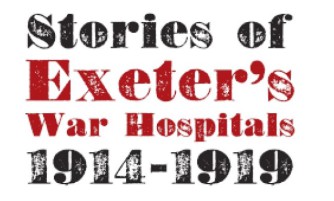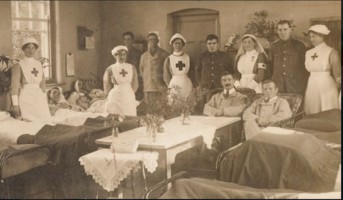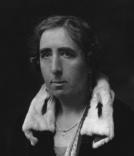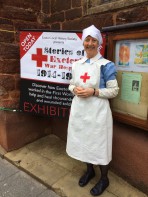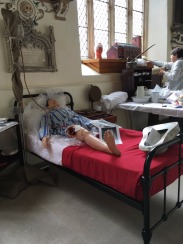
An exhibition held at
St Stephens Church in Exeter High Street
19-23 September 2017
Exeter’s First World War Red Cross Hospitals were amongst the earliest to be commissioned by the War Office after war broke out. Ready by the end of August, they took their first patients at the beginning of October and by Christmas 1914 they provided more Red Cross beds than any other provincial town in Britain. This was a lead they maintained under their redoubtable administrator Georgiana Buller, the only woman to keep her post as Administrator, in defiance of military protocol, under the War Office takeover of large Red Cross hospitals in 1916.
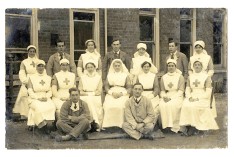 A group of staff and patients at Hospital No. 3 which had been built as the Workhouse's Children's Home, Heavitree
A group of staff and patients at Hospital No. 3 which had been built as the Workhouse's Children's Home, Heavitree
Over 35,000 patients, mostly sent back from France or Flanders by hospital ship and then ambulance train from Southampton, were treated in Exeter’s eight hospitals between 1914 and 1919. By the war's end there were more than 1,400 beds available for patients in Exeter.
Almost all the buildings used as temporary hospitals still survive in Exeter, though all are now used for different purposes.
The exhibition featured many pictures lent or bequeathed by those who were patients or staff at the time and illustrated the daily life in the Exeter hospitals, the treatments available, and how local communities pulled together to give time and money to make the patients’ lives as comfortable as possible.
Between 2,200 and 2,500 people attended over the five days, many more than we anticipated. No doubt the nurse in uniform at the front door and the Spotlight feature helped swell the numbers.
Some people had memories from their own childhood of treatments such as the bread poultice. Others recalled family stories about grandparents and great uncles and aunts who had fought or nursed in the First World War.
Our seriously wounded soldier in his bed proved very popular as did the array of medical and nursing equipment of the period.
There was general surprise about this piece of Exeter’s history. As one comment put it: ‘We didn’t realize the amount of help Exeter did for our war heroes’. And many, many comments about the experience of war, as in ‘God bless them all – and never again!’ Recorded on feedback cards were comments such as ‘ A Five Star Exhibition’; ‘More like this, please!’; ‘Looking forward to the next one’.
If you know of family members or indeed of any other other people who served or were treated in Exeter's Red Cross hospitals during the First World War, please contact Julia Neville, Research Group Co-ordinator on j.f.neville@btinternet.com.
